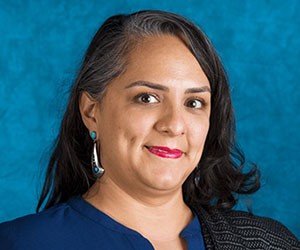Why Pursue a Early Childhood Education Master's Degree
Accredited by the Commission on the Accreditation of Early Childhood Higher Education Programs of the National Association for the Education of Young Children, the Master of Arts in Early Childhood and Elementary Education offers focused areas of interest as well as customized programs for students to pursue their preferred area of study.
With personalized attention and low students-to-teacher ratios, this program is perfect for those looking to grow their educational skills and/or focus on research and application appropriate for further graduate study or professional growth.
See What Our Students Say
When you choose UT San Antonio, you join a community of talented students being taught by award-winning faculty. See what our students have to say.
Admission & Application Requirements
Applications are submitted through the UT San Antonio Graduate Application. Please upload all required documents (listed below) on your UT San Antonio Graduate Application. It is the applicant’s responsibility to ensure completion and submission of the application, a nonrefundable application fee, and all required supporting documents are on file with UT San Antonio by the appropriate application deadline.
| Early Childhood and Elementary Education (MA) | ||
|---|---|---|
| Required Degree | Bachelor's Degree from an accredited college or university in the United States or have proof of equivalent training at a foreign institution. | |
| Minimum GPA | 3.0 (on a 4.0 scale) Departments may consider GPA of last 60 semester credit hours | |
| Coursework | Completed adequate credit hours or foreign institution equivalent coursework as preparation for the program. | |
| Transcripts* | Required from all institutions attended; international transcripts must be recorded/translated to English | |
| Credential Evaluation | Required if you have earned university-level credit from foreign institutions. Submit an evaluation of your transcripts from FCSA or any NACES-approved credential evaluation agency. | |
| English Language Proficiency | 79 TOEFL iBT / 6.5 IELTS / Duolingo 100 For exams taken on or after January 21, 2026: We require a minimum TOEFL iBT score of 4.0. |
|
| *Unofficial transcripts will be taken into consideration for admissions; however, if admitted into the program, you must submit official transcripts to the University. | ||
Application Deadlines
Applicants are encouraged to have their admission file completed as early as possible. All applications, required documents and letters of recommendation, if applicable, must be submitted by 5:00 PM U.S. Central Time on the day of the deadline. Deadlines are subject to change.
| Early Childhood and Elementary Education (MA) | |||
|---|---|---|---|
| Timing on Admission Decision: Completed applications will be reviewed for admission on a rolling basis. Decisions generally will be made and sent to applicants within 4 to 6 weeks of receiving the application. | |||
| Application Deadlines for: | Priority | International | Domestic |
| Spring 2026 | November 1 | December 1 | |
| Summer 2026 | April 1 | May 1 | |
| Fall 2026 | June 1 | August 1 | |
| Spring 2027 | November 1 | December 1 | |
| Summer 2027 | April 1 | May 1 | |
Funding Opportunities
ResourcesCareer Options
UT San Antonio prepares you for future careers that are in demand. The possible careers below are based on data pulled by a third-party tool called Emsi, which pulls information from sources like the U.S. Bureau of Labor Statistics, U.S. Census Bureau, online job postings, other government databases and more to give you regional and national career outlook related to this academic program.
Courses are offered at night once a week for three hours (6 PM to 8:45 PM) Monday-Thursday in the fall or spring. Or during the day for two hours a day, Monday through Friday in the four-week summer sessions. In addition, some courses are available at night, meeting Monday through Friday for three weeks in the May-mester.
This program is housed on Main Campus.
- Both qualitative and quantitative, as well as mixed methods
- School settings and community based contexts
- Some included areas: teacher professional development, obesity prevention, dual language instruction, environmental education, interdisciplinary teaching, and differentiated instruction.

Graduate Advisor of Record
Marissa Munoz, PhD
210-458-5969

